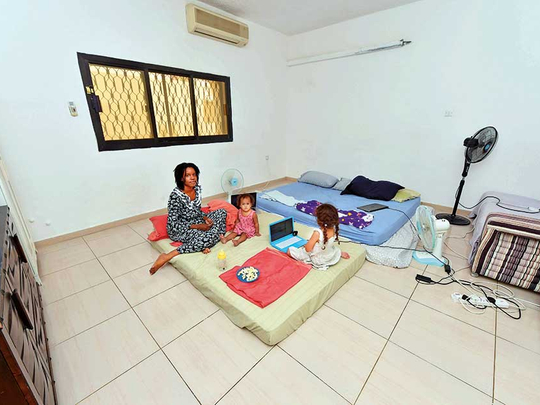
Dubai: With malls being a large part of social life in the UAE, contemplating to shift your lifestyle to one that follows the trending concept of minimalism may be challenging.
The constant alerts for sales and bargains delivered through SMSes, billboards, emails and online pop-ups make online shopping, retail therapy and impulsive purchases a lot more common.
Dr Madeeha Afridi, counselling psychologist at Light House Arabia, defined minimalism as “reducing or getting rid of objects that do not serve a purpose, bring joy and peace into one’s life”.
Ahmed Kutty/Gulf News
Jana Xiolier realised how much she doesn’t need when she was forced live for three months with basic necessities.
However, like many concepts, the level of minimalism practised can vary from decluttering, to reducing one’s belongings to the very basic necessities.
For 28-year-old Jana Xiolier, from Trinidad and Tobago, living as a minimalist was a decision she made when she moved to Abu Dhabi over three years ago.
Having moved from the Netherlands with her husband and three children, after shipping a full container of cargo, Xiolier was forced to live with just the basic necessities for three months, until her shipment was cleared at security.
“I realised how much I didn’t need, and just how many things we had when we tried unpacking all the boxes. So I decided to get rid of most of it, and became a minimalist,” she said.
Today, Xiolier own 30 pieces of clothing, including 10 identical dresses, two pairs of jeans, and eight T-shirts. She is often comfortable in her flip-flops and doesn’t see the need to own any more items of clothing.
Jana Xiolier with her children in their house.
“Getting rid of things can be very hard because we as humans have strong attachments to things we buy, but what’s harder is to stop collecting things. It’s like being on a diet, and keeping off the weight afterwards,” explained Xiolier.
The Abu Dhabi resident also decided to declutter her house getting rid of unused furniture, unworn children’s clothes, and spare toys.
“I used to be a hoarder and have lots of clothes that I never wore. Now I have things that I need, and it’s made it a lot easier to clean the house,” Xiolier told Gulf News.
Her two-bedroom apartment has simple furniture pieces, including two closets, three stands, and two large king-size mattresses.
“Living like a minimalist is not something you can do if you don’t have money. It’s important to know that even if you live with just a few belongings, you have financial security to be able to buy something if you need it,” said Xiolier.
The mother of three has started a Facebook page called ‘Minimalism UAE Minimalist lifestyle,’ to attract residents with a similar mindset to interact and share tips on how to declutter their lives.
Emotional well-being
With the new concept of minimalism inspiring people to live with less, Dr Afridi pointed out the direct correlation between people getting rid of material possessions they know hold no value to them, and their mental, physical and emotional well-being.
“As those individuals declutter their physical space, they report feeling like they have more clarity and space, mentally and emotionally, to live a life that feels more meaningful and healthy for them,” said Dr Afridi.
Xiolier decided to declutter her house getting rid of unused furniture, unworn children’s clothes and spare toys.
She pointed out the desire to want to own less and live a minimalistic lifestyle can be brought on by a certain life situation or through the course of therapy, where one is gaining greater self-awareness.
“They start realising that their habits of spending money have a deeper root cause, which could stem from something that they have been avoiding to face or have not paused to face. They begin to question and understand the desire to accumulate things,” explained Dr Afridi.
Looking at patients’ cases at the clinic, Dr Afridi said the desire to want to live with less among UAE residents is also brought about through greater awareness and education in the society.
People are finally acknowledging the heavy emphasis that society places on consumerism and the need to own things, making them more conscious of their personal choices instead of “following societal messages and pressures”.
“There is more mindfulness about living a value-centred life, with more people realising the way to do that is to understand and shed light on every area of their life, including how they spend their money and what they choose to allow to take space in their life, in this context, material objects,” said Dr Afridi.
She explained that this path of self-discovery and exploration can lead some people to begin to declutter their life.
However, challenges haltering people from becoming mindful of their consumption needs can also be linked to technology and living in the digital and social age.
It is a common practice for many people to “over-share their life experiences or personal possessions, which can trigger feelings of jealousy, envy, and comparison,” and can then push them to buy more things, said Dr Afridi.
She answered the questions of whether one can become a minimalist in Dubai by pointing out that shifts can happen when individuals begin to put their energy to do the personal work in healing the root causes of their overconsumption habits. “Only then can they live a life more aligned with their values, to begin to feel a deeper, more authentic sense of joy, calmness, and fulfilment,” she added.







